
Journal Menu
► ▼ Journal Menu-
- Mathematics Home
- Aims & Scope
- Editorial Board
- Reviewer Board
- Topical Advisory Panel
- Instructions for Authors
- Special Issues
- Topics
- Sections & Collections
- Article Processing Charge
- Indexing & Archiving
- Editor’s Choice Articles
- Most Cited & Viewed
- Journal Statistics
- Journal History
- Journal Awards
- Society Collaborations
- Conferences
- Editorial Office
Journal Browser
► ▼ Journal BrowserNeed Help?
Announcements
3 April 2025
Interview with Dr. Martynas Patašius—Mathematics Exceptional Reviewer 2024
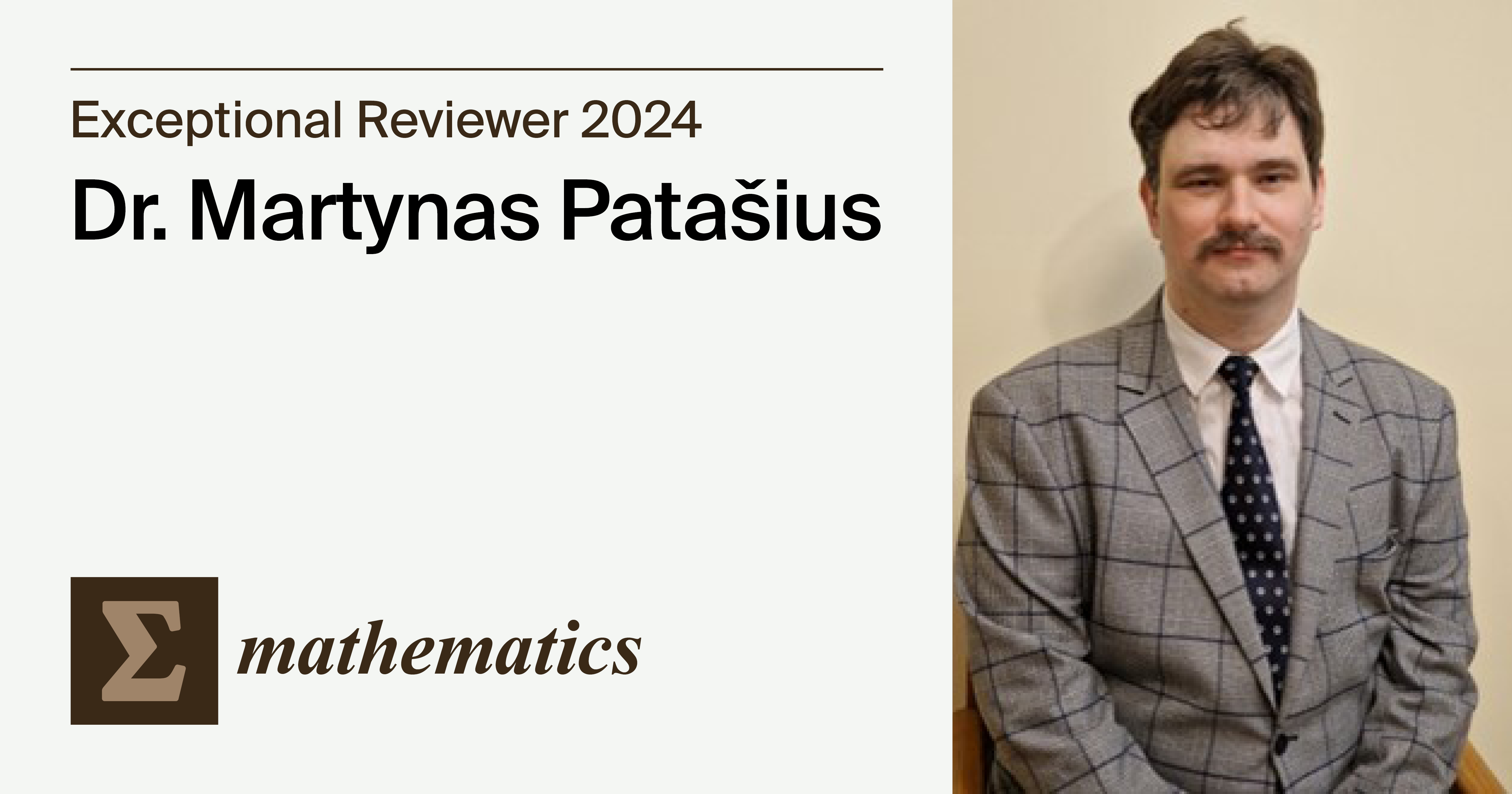
Name: Dr. Martynas Patašius
Affiliation: Kaunas University of Technology, Lithuania
Research interests: biomedical image analysis; finite element method; business games; voting theory
The following is a short interview with Dr. Martynas Patašius:
1. Could you give a brief introduction to yourself to the readers? Could you introduce your current research direction and provide an update on your progress?
I am a computer scientist working at the Kaunas University of Technology. I work in many research fields—voting theory, finite element modeling, business games, etc.
2. Can you please share with us your sentiments about winning the award?
I am honored.
3. Could you share some insights into your approach to reviewing manuscripts? How do you balance thoroughness with efficiency?
There is not much to it. I simply read the paper, more or less as if I were a reader and not a reviewer. Then, the places where the text becomes hard to understand might indicate where, for example, some notation has been left unexplained.
4. In your opinion, what are some key qualities that make a review outstanding?
A review is primarily meant to make the flaws of the paper clear so that they can be dealt with. Because of that, I would say that, first of all, a good review has to list only the true flaws that are in the paper. There could be other good qualities (for example, finding many flaws, indicating how some flaws could be corrected), but these are much less important.
5. Based on your experience, which research topics do you think are of particular interest to the research community in the coming years?
This is hard to say. Perhaps, at the moment, there will be some work finding out how to use LLMs in various fields of research.
2 April 2025
MDPI INSIGHTS: The CEO's Letter #21 - Annual Report, Swiss Consortium, IWD, ICARS, Serbia

Welcome to the MDPI Insights: The CEO's Letter.
In these monthly letters, I will showcase two key aspects of our work at MDPI: our commitment to empowering researchers and our determination to facilitating open scientific exchange.
Opening Thoughts

MDPI Releases 2024 Annual Achievements Report
I’m pleased to share the release of MDPI’s 2024 Annual Achievements Report, which reflects our commitment to efficiency, transparency, and excellence in scholarly communication. The report showcases key themes related to our growth (highlighting our workforce expansion, new offices, journal milestones), excellence (editorial and publishing advancements), people (talent development and training), and community (partnerships, conferences, and outreach).
MDPI continues to build connections and drive scientific progress
Our mission remains clear: to support researchers worldwide by delivering an efficient, high-quality publishing experience while strengthening the global Open Access (OA) movement.
Advancing Open Access: A Global Knowledge Hub
In 2024, we published 238,000 peer-reviewed OA articles, reaching over 25 million downloads. This reinforces MDPI’s role as a global knowledge hub, breaking down barriers to access and ensuring that high-quality research is freely available to everyone. As part of the OA movement, we are actively democratizing knowledge, making scientific advancements accessible to researchers, policymakers, educators, and the public, without the restrictions of traditional paywalls.
Expanding our Workforce and Strengthening Research Integrity
Our global presence grew in 2024 with the opening of a new Seoul office, and our workforce expanded to 6,650 staff across 21 offices. This reflects our continued growth mindset and investment in global accessibility. We also continued to take a proactive stance on our commitment to research integrity, tripling our team in this area and joining STM’s Integrity Hub and United2Act. This means more rigorous quality control, stronger safeguards, and collaboration with global initiatives to detect and combat unethical publishing practices at an industry level. Our growth is about reinforcing our role as a trusted, ethical, and accessible publishing platform for researchers worldwide.
Growing Partnerships and Impact in Scholarly Communication
MDPI’s partnerships continue to thrive, with over 900 institutional collaborations, including a landmark agreement with ZB MED in Germany, covering more than 100 universities. Additionally, more than 90% of evaluated MDPI journals have been accepted into Web of Science, including 60 new acceptances in 2024, with nearly 300 journals expected to receive a Journal Impact Factor in 2025. In the same period, 37 MDPI journals were accepted into Scopus, bringing our total indexed titles to 306. Most importantly, 95% of authors rate their experience with MDPI as excellent or good – an achievement that underscores our dedication to serving the research community.
I encourage you to read through our Annual Report, which highlights these milestones and our vision for the future. Thank you for being part of MDPI’s journey in advancing open science.
Impactful Research

MDPI Renews Partnership with CSAL to Support Swiss Universities
I am pleased to announce the renewal of our partnership with the Consortium of Swiss Academic Libraries (CSAL) for 2025. This extension reinforces MDPI's dedication to advancing open science through transparency, efficiency, and collaboration.
Our renewed agreement with CSAL strengthens support for Swiss universities, ensuring that gold open access publishing remains both accessible and affordable for researchers across Switzerland. Among the institutions participating in this agreement are ETH Zurich and EPFL Lausanne, along with 20 other leading institutions, further expanding the reach and impact of our collaborative efforts.
To date, over 3.9 million researchers have published their findings in MDPI journals, a testament to our role in enhancing Switzerland's position as a hub for university education and research.
Inside MDPI

Celebrating International Women's Day: Accelerating Action
In honour of International Women's Day, MDPI embraced the theme “Accelerate Action,” a global call to advance women's progress by implementing effective strategies and resources. As part of our commitment, we highlighted how open access publishing empowers female voices in research and academia.
Throughout March, we featured original blogs authored by MDPI’s female contributors, showcasing the successes of our journals and employees, and addressing pressing topics such as women's health.
“Open Access supports women in education”
Women Accelerating Action Outside of MDPI

MDPI employee Ana Zdravkovic is accelerating action outside of her MDPI role as a Production Assistant. Working with like-minded women at the award-winning Belgrade-based organization UZOR OsnaŽene (meaning ‘empowered women’), they identify serious flaws in cybersecurity, and help protect women and children against online predators by providing evidence to improve legislation and laws around cyber-attacks.
In this article, we interview Ana, celebrating the important and inspiring work that she and the organisation do.
How Open Access Supports Women in Education

Every day, women and girls face barriers in education or career progression. This is caused by a range of factors, including social expectations, poverty, and poor infrastructure.
Quality opportunities and participation in the education system by women is essential to achieving equality and fulfilling their human rights.
Here, we examine how Open Access supports women in education by removing barriers and ensuring that vital research is accessible.
Recent Advancements in Research on Endometriosis

March is Endometriosis Action Month. Endometriosis is a medical condition affecting women and young girls of reproductive age, often causing symptoms such as severe pelvic pain, irregular periods, and infertility.
More research on endometriosis is still urgently needed.
This research will help develop efficient diagnoses and better treatment for those struggling with the condition.
In this article, we explore what endometriosis is and discuss the latest research advancements on the disease.
We also curated a selection of MDPI journals, articles, and Special Issues focusing on gender equity, women in the workplace, and women’s health. Find out more about these by visiting our IWD – Accelerate Action landing page.
As I reflect on the month of March and International Women’s Day, I would like to take a moment to recognize and thank all of the incredible women at MDPI for your dedication to democratizing knowledge and shaping open access. Your contributions are invaluable, and they continue to shape the future of MDPI.
Coming Together for Science

The International Conference on Advanced Remote Sensing (ICARS 2025)
The International Conference on Advanced Remote Sensing (ICARS 2025) took place from 26–28 March 2025, in Barcelona, Spain. It was chaired by Prof. Dr. Fabio Tosti from the Faringdon Research Centre for Non-Destructive Testing and Remote Sensing (UK), Prof. Dr. Andrea Benedetto from University Roma Tre (Italy), and Prof. Dr. Luis Ángel Ruiz from Universitat Politècnica de València (UPV, Spain).
Over three days, the conference explored innovations in Earth and environmental sciences, engineering advancements, and practical applications in biological and agricultural fields.


I am pleased to share that the 1st edition of ICARS 2025 was a great success, with 133 attendees out of 146 registrations. The event featured 43 short talks, 64 posters, and 103 accepted abstracts, along with nine keynote speakers and a major panel with five expert panellists.
Over 60 attendees joined the conference dinner, and the event received outstanding feedback.
The main goal of ICARS2025 was to cover how advanced remote sensing technologies are transforming our approach to global challenges.

Awards
Four awards were presented at the conclusion of the conference, sponsored by the journal Remote Sensing: Best Poster Award (€400), Best Oral Presentation Award (€400), and two Early Career Researcher Awards (1st prize: €600 and 2nd prize: €200).
Thank you to our Partnering Societies
We are grateful for the support of our four partnering societies and nine media partners, who played an important role in promoting the conference. Special thanks to our partnering societies: the European Federation of Geologists (EFG), Geoscience Energy Society of Great Britain (GESGB), Asociación Española de Teledetección (AET) – the Spanish Association of Remote Sensing, and the International Society for Digital Earth (ISDE).
Upcoming In-Person Event

31 March–2 April 2025
Plants 2025: From Seeds to Food Security
Location: Barcelona, Spain
This event will gather plant scientists to discuss the latest research on how to feed a growing population while maintaining a sustainable agro-ecosystem.
Find more upcoming MDPI events here.
Closing Thoughts

MDPI Serbia Salon 2025: A Gathering of Academic Excellence
On Tuesday, 18 March, we successfully concluded our first MDPI Serbia Salon in Belgrade. This event provided a great opportunity to showcase MDPI’s achievements, strengthen connections with the Serbian academic community, and highlight our role as the largest publisher in Serbia. We were honoured to welcome Prof. Dr. Sergej M. Ostojić, Editor-in-Chief of MDPI journal Clinical Bioenergetics, as a guest speaker.

Over the past five years, MDPI has experienced continuous growth in Serbia, with an increasing number of publications, an expansion of Editorial Board memberships, and a greater number of active peer reviewers. The Salon allowed us to express our thanks to the Serbian research community while gathering feedback from attendees representing several major universities.
Discussion topics

As part of the event, I delivered an opening speech highlighting MDPI’s achievements and direction.
The event featured presentations from MDPI colleagues, including discussions on open science, publishing ethics, and our achievements in Serbia.
A special thank-you to all our MDPI presenters, panellists, and organizers who made his event a success. I hope the MDPI Serbia Salon becomes a tradition for years to come, creating connections within the Serbian research community.
Visit to the Science Fund of Serbia and The Ministry of Science
During my visit to Belgrade, I had the opportunity to join my colleagues Emir Ramadani (Operations Manager) and Nevena Blagojev (Journal Relations Manager) in meetings with the Science Fund of Serbia and the Ministry of Science, where we received strong support for our work in Serbia.
Both organizations highly value our presence in and commitment to Serbia, where we employ over 640 staff across our two offices in Belgrade and Novi Sad. We take great pride in creating job opportunities and supporting the community in Serbia.

“There’s a lot of exciting activity happening in MDPI Serbia”
Speaking with our Serbian Colleagues

Finally, I had the opportunity to speak with our Serbian colleagues about our initiatives to expand and to improve our marketing & communication and public relations activities.
It was great to have an open discussion with colleagues – both in person and with the hundreds who joined online.
This visit to Belgrade had been a long time coming for me. Serbia is our largest operation in Europe and there’s a lot of exciting activity happening in MDPI Serbia, including the launch of a new office floor in Novi Sad and the growth and expansion of our teams.
I look forward to returning soon and continuing to support our colleagues across our Serbian offices.
Chief Executive Officer
MDPI AG
1 April 2025
Interview with Dr. Sandra S. Ferreira—Mathematics Exceptional Reviewer 2024
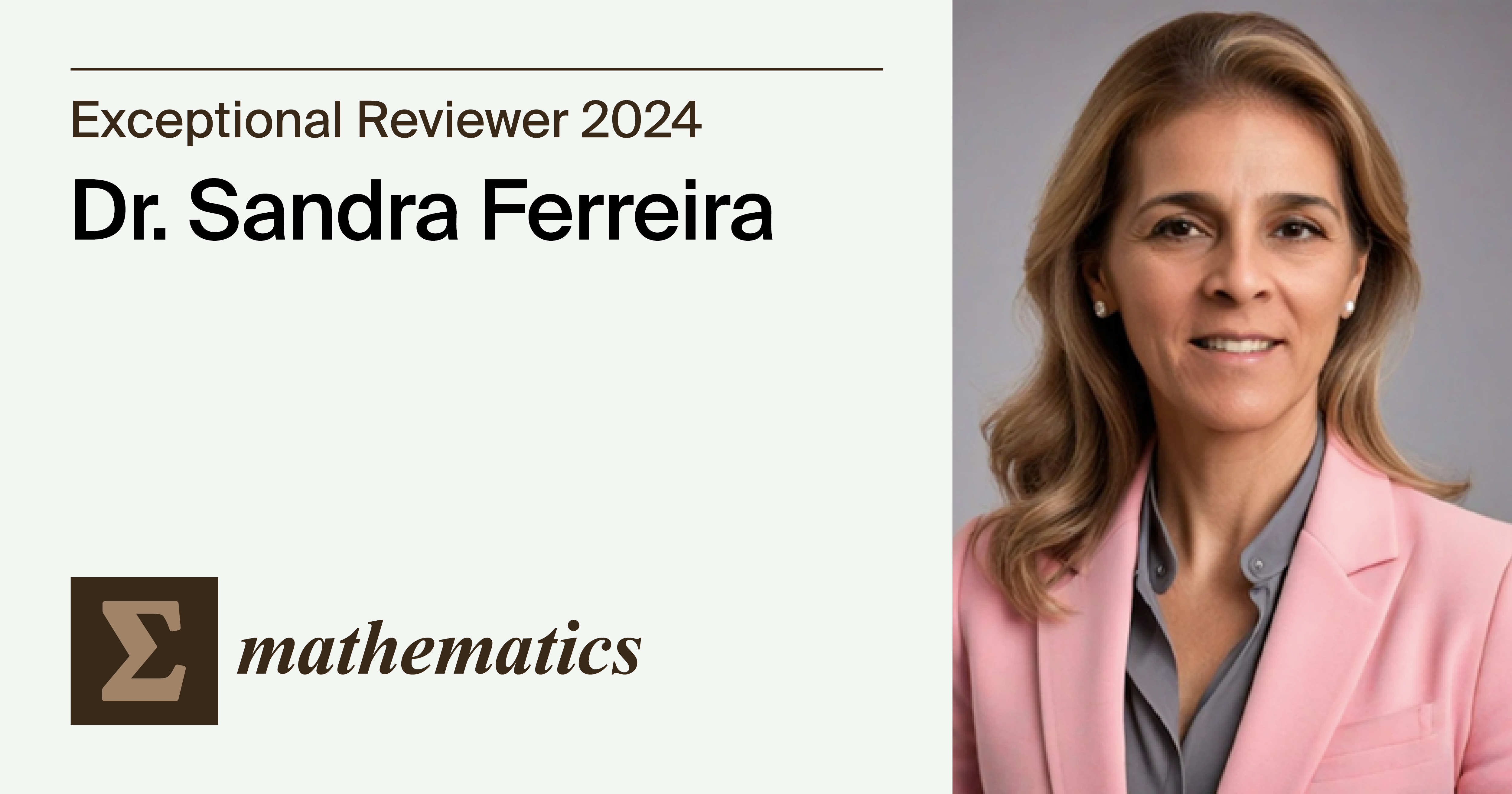
Name: Dr. Sandra S. Ferreira
Affiliation: Mathematics Department and Centre of Mathematics and Applications, University of Beira Interior, Covilhã, Portugal
Research interests: mathematical statistics; statistical analysis; statistical modeling; statistical inference; applied statistics; computational statistics; applied probability; mixed models; F-tests; applied mathematics; probability theory; data analysis models; linear; mixed models; random sampling; confidence intervals; linear regression; multivariate statistics
The following is a short interview with Dr. Sandra S. Ferreira:
1. Could you give a brief introduction of yourself to the readers? Could you introduce your current research direction and provide an update on your progress?
I am an Assistant Professor at the University of Beira Interior (UBI), Portugal, in the department of mathematics and I am also a member of the Centre of Mathematics and Applications at UBI, as well as a collaborator with the Centre of Mathematics and Applications at FCT Nova. I have a Ph.D. in mathematics from UBI, an M.Sc. in applied mathematics from the University of Évora, and a B.Sc. in mathematics with a focus on probability and statistics. My research interests lie in statistics and applied mathematics, particularly statistical inference in linear models and the study of statistical distributions. I have published research in the fields of probability and statistics and have been involved in several research projects. I serve as a guest reviewer for international journals, and I am part of the scientific committee for international conferences.
2. Can you please share with us your sentiments upon winning the award?
It is truly an honor to receive this award. The real pleasure, however, comes from the opportunity to review such high-quality manuscripts. Each paper I review broadens my knowledge and allows me to contribute to the advancement of our field.
3. Could you share some insights into your approach to reviewing manuscripts? How do you balance thoroughness with efficiency?
I start by carefully reading the entire manuscript to see its overall structure and contribution. Then, I focus on specific sections, analyzing methodology, results, and conclusions. The editorial team has been exceptionally efficient and helpful, which greatly facilitates this process.
4. In your opinion, what are some key qualities that make a review outstanding?
In my opinion, the key qualities are as follows:
a) Constructive criticism that helps authors improve their work;
b) Clear and specific feedback, pointing out both strengths and areas for improvement;
c) A thorough understanding of the paper's context and contribution to the field;
d) Timeliness in submitting the review.
5. Based on your experience, which research topics do you think are of particular interest to the research community in the coming years?
I believe some research topics of particular interest to the community in the coming years will include the following:
- Advanced statistical methods for big data and machine learning;
- Novel approaches to handling non-standard data structures;
- Interdisciplinary applications of statistical methods, especially in areas like climate science and personalized medicine;
- Development of robust methods for causal inference in observational studies.
28 March 2025
Interview with Dr. Rui Santos—Mathematics 2024 Exceptional Reviewer
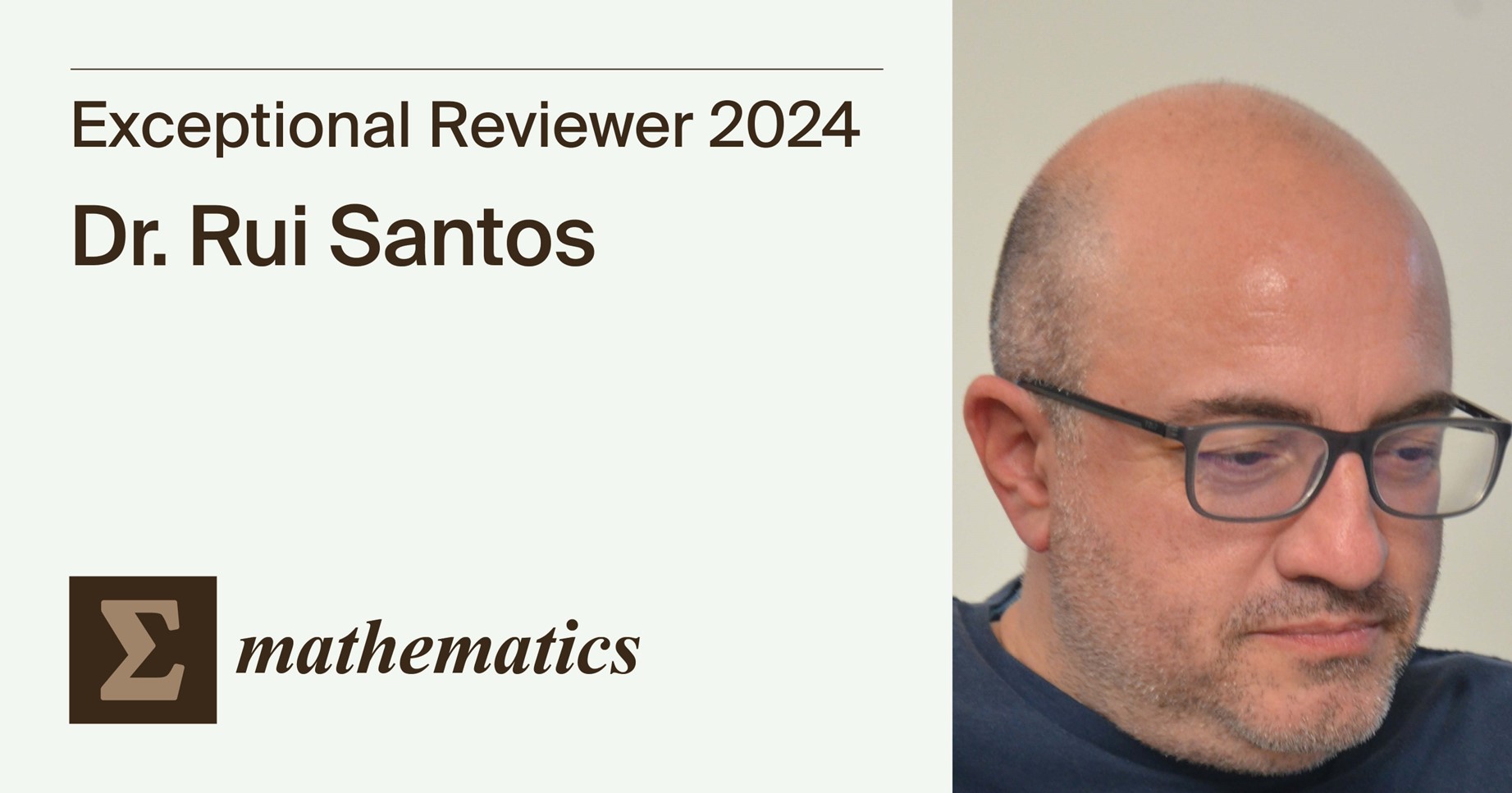
Name: Dr. Rui Santos
Affiliation: School of Technology and Management of the Polytechnic University of Leiria
Research Interests: statistical inference; data science; simulation; distributions; epidemiology; classification; dental age estimation; meta-analysis; pooled sample designs; teaching and history of probability and statistics
The following is a short interview with Dr. Rui Santos:
1. Could you give a brief introduction to yourself to the readers? Could you introduce your current research direction and provide an update on your progress?
I am a Professor of statistics at the Polytechnic University of Leiria and a member of CEAUL—Center of Statistics and Applications at the University of Lisbon, Portugal. My research currently explores classification methodologies based on compound testing, specifically hierarchical and array-based group testing approaches. These methodologies enable significant resource savings in certain contexts while maintaining reliable classification criteria. The challenge lies in identifying the most effective methods that balance accuracy with efficiency compared to traditional individual testing. These techniques have applications in both epidemiology and statistical quality control. Through simulations, we have obtained promising results that contribute to optimizing these methodologies.
2. Can you please share with us your sentiments about winning the award?
I am truly honored and delighted to be recognized for my contributions to peer review.
3. Could you share some insights into your approach to reviewing manuscripts? How do you balance thoroughness with efficiency?
I typically begin with a broad reading of the manuscript to grasp its main ideas. This initial review helps me assess its merit and identify areas that need further development or clarification. From there, I conduct a more detailed evaluation, ensuring my feedback is both constructive and efficient.
4. In your opinion, what are some key qualities that make a review outstanding?
An excellent review requires staying up to date with the latest developments in the field and maintaining a constructive perspective on the work being evaluated. Even if a manuscript is not accepted for publication, constructive criticism helps authors refine their research and improve their work. As an author myself, I understand that while criticism can be challenging to receive, it is invaluable in enhancing the quality of a paper and sometimes leads to an even stronger publication.
5. Based on your experience, which research topics do you think are of particular interest to the research community in the coming years?
The rapid advancement of computing power has significantly influenced research in data science. In statistics, areas such as simulation, resampling, high-dimensional data analysis, Bayesian statistics, and statistical learning continue to evolve, alongside various machine learning methodologies. I anticipate that these fields will experience substantial qualitative advancements in the coming years, driving new insights and innovations.
14 March 2025
International Day of Mathematics—“Mathematics, Art, and Creativity”, 14 March 2025
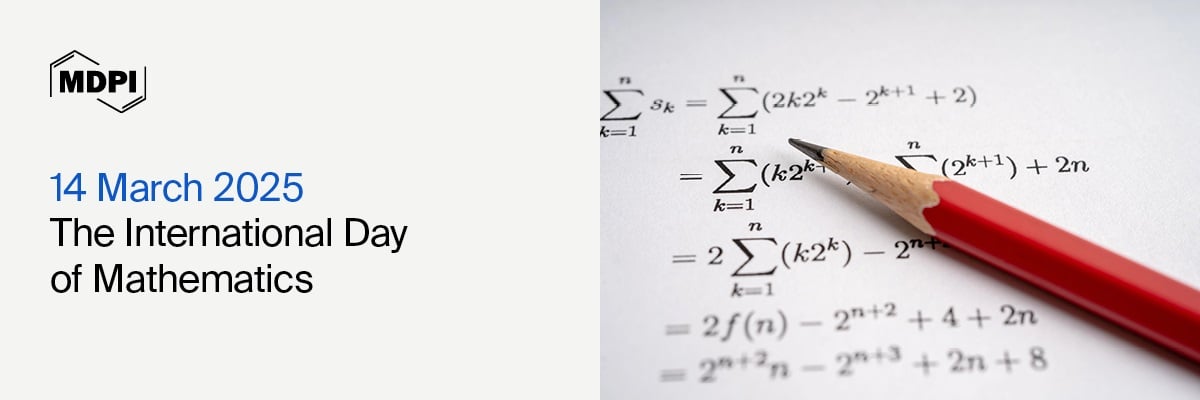
With the growing recognition of mathematics as a vital component of artistic expression and innovative thinking, it has now evolved far beyond its traditional role as a problem-solving tool; mathematics serves as a source of inspiration, a bridge between logic and creativity, and a universal language that connects us all. The theme of International Day of Mathematics (IDM) this year is “Mathematics, Art, and Creativity”, with the aim of exploring the interplay between numbers, patterns, and human imagination while bringing awareness to interdisciplinary applications of mathematics.
In recognition of the 2025 International Day of Mathematics, we invite you to explore the captivating interplay between numbers, patterns, and human imagination. As part of this celebration, we examine the progressive role that mathematics plays across disciplines through our upcoming webinars. From the intricate designs of fractals to harmonious proportions in architecture, we will share the inspiring stories of mathematicians, artists, and innovators pushing the boundaries of creativity. Additionally, we have curated a collection of open access research articles that explore this fascinating relationship, freely available to researchers, educators, and enthusiasts worldwide.


| Session 1 | Session 2 |
| Date: 14 March 2025, 07:00 (CET) Webinar ID: 886 5910 5983 Free to register for this webinar here! |
Date: 14 March 2025, 16:00 (CET) Webinar ID: 897 5592 5773 Free to register for this webinar here! |

|
Computer Science & Mathematics |
Biology & Life Sciences
Business & Economics |

“Trigonometric Polynomial Points in the Plane of a Triangle”
by Clark Kimberling and Peter J. C. Moses
Geometry 2024, 1(1), 27-42; https://doi.org/10.3390/geometry1010005
“Sheaf Cohomology of Rectangular-Matrix Chains to Develop Deep-Machine-Learning Multiple Sequencing”
by Orchidea Maria Lecian
Int. J. Topol. 2024, 1(1), 55-71; https://doi.org/10.3390/ijt1010005
“Evolution of Hybrid Cellular Automata for Density Classification Problem”
by Petre Anghelescu
Symmetry 2024, 16(5), 599; https://doi.org/10.3390/sym16050599
“The Flexible Gumbel Distribution: A New Model for Inference about the Mode”
by Qingyang Liu, Xianzheng Huang and Haiming Zhou
Stats 2024, 7(1), 317-332; https://doi.org/10.3390/stats7010019
“Precision-Driven Product Recommendation Software: Unsupervised Models, Evaluated by GPT-4 LLM for Enhanced Recommender Systems”
by Konstantinos I. Roumeliotis, Nikolaos D. Tselikas and Dimitrios K. Nasiopoulos
Software 2024, 3(1), 62-80; https://doi.org/10.3390/software3010004
“Shrinking the Variance in Experts’ “Classical” Weights Used in Expert Judgment Aggregation”
by Gayan Dharmarathne, Gabriela F. Nane, Andrew Robinson and Anca M. Hanea
Forecasting 2023, 5(3), 522-535; https://doi.org/10.3390/forecast5030029
“Big Data Analytics and Machine Learning in Supply Chain 4.0: A Literature Review”
by Elena Barzizza, Nicolò Biasetton, Riccardo Ceccato and Luigi Salmaso
Stats 2023, 6(2), 596-616; https://doi.org/10.3390/stats6020038
“An Agile Model-Based Software Engineering Approach Illustrated through the Development of a Health Technology System”
by Moe Huss, Daniel R. Herber and John M. Borky
Software 2023, 2(2), 234-257; https://doi.org/10.3390/software2020011
“Modelling of Tissue Invasion in Epithelial Monolayers”
by Faris Saad Alsubaie, Hamid Khataee and Zoltan Neufeld
Life 2023, 13(2), 427; https://doi.org/10.3390/life13020427
“Practical Understanding of Cancer Model Identifiability in Clinical Applications”
by Tin Phan, Justin Bennett and Taylor Patten
Life 2023, 13(2), 410; https://doi.org/10.3390/life13020410


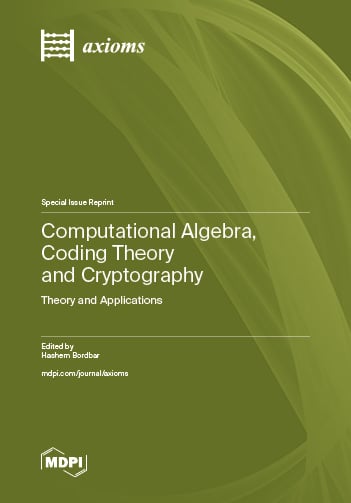 |
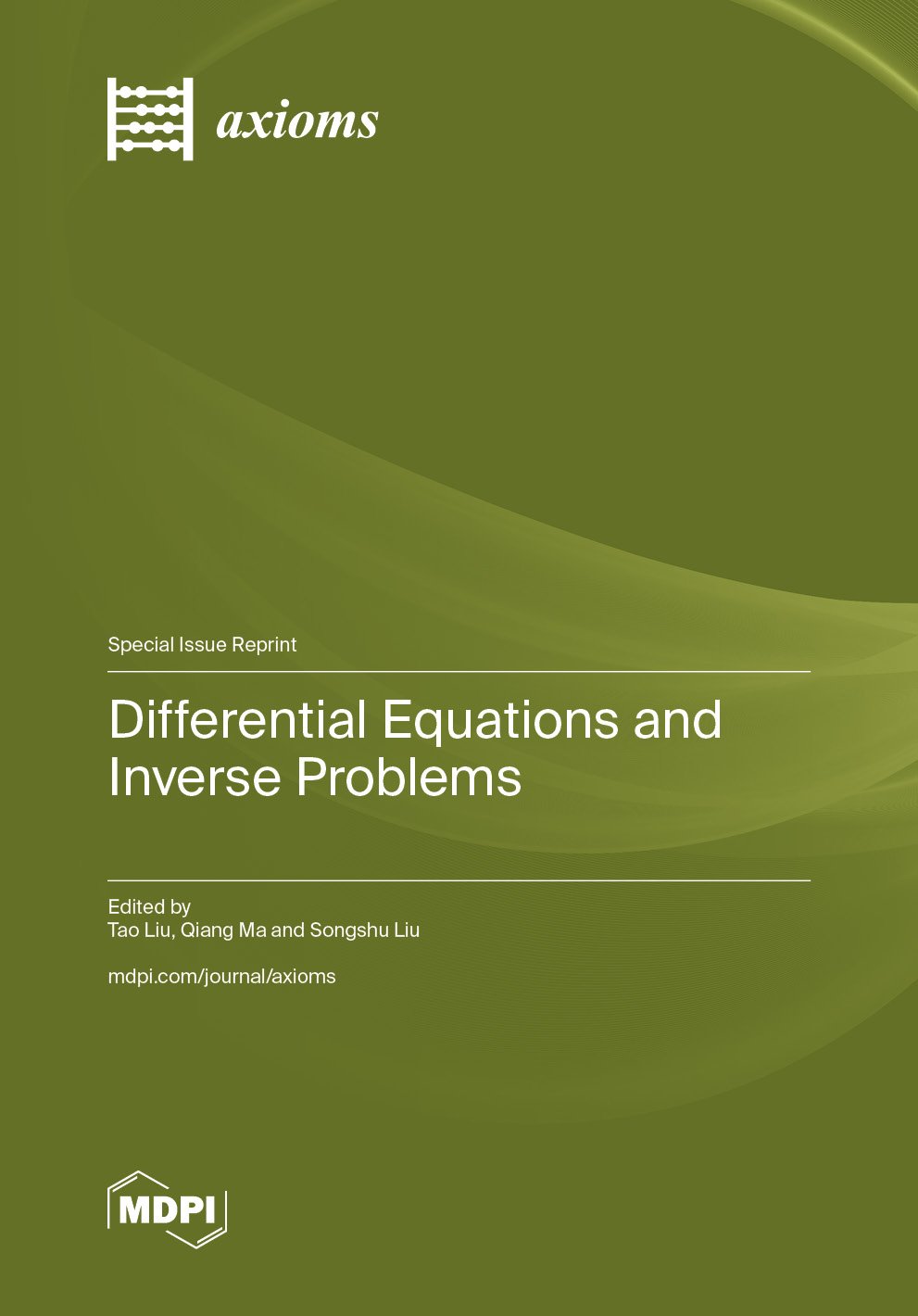 |
12 March 2025
Interview with Dr. Joseph Lakey—Mathematics Exceptional Reviewers 2024
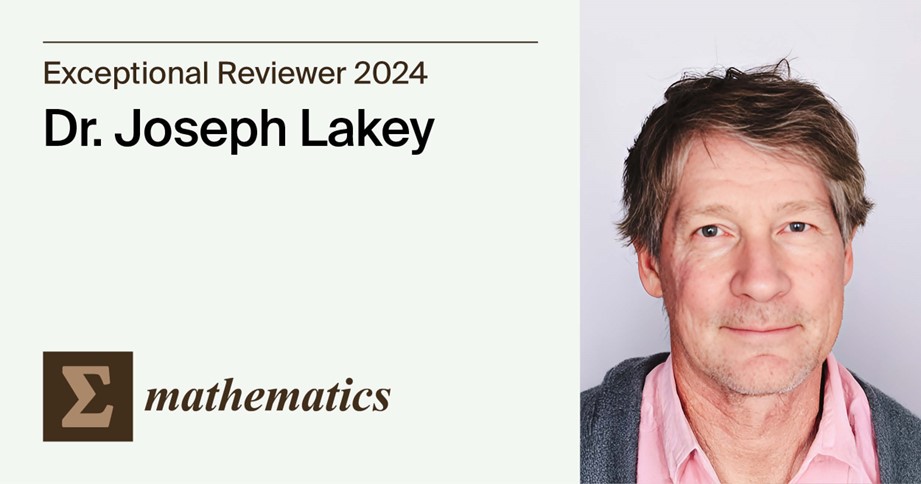
Name: Dr. Joseph Lakey
Affiliation: New Mexico State University, Las Cruces, United States
Research interests: harmonic analysis; signal processing; spectral graph theory
Brief introduction: I am an Associate Dean in the College of Arts and Sciences at New Mexico State University in Las Cruces, New Mexico, USA. I have worked at NMSU for over 25 years.
The following is a short interview with Dr. Joseph Lakey:
1. Could you give a brief introduction of yourself to the readers? Could you introduce your current research direction and provide an update on your progress?
The past five years I have been studying primarily spectral graph theory for certain special types of graphs in which there should be results analogous to known results from classical harmonic analysis. I have also been working on higher dimensional versions of so-called prolate functions and prolate wavelets using techniques from Clifford analysis.
2. Could you share with us your emotions upon winning this award?
I am very pleased to be recognized as an exceptional reviewer for Mathematics. The peer review process can be quirky but is critical for maintaining scientific standards. The vast majority of work I have reviewed for Mathematics is scientifically sound but can make a much more significant impact by providing clear motivation and context to explain where the results fall into the scope of other work, and how they advance the field of study.
3. Could you share some insights into your approach to reviewing manuscripts? How do you balance thoroughness with efficiency?
MDPI puts an emphasis on a fast publication cycle. I try to give manuscripts a quick initial read to orient myself, to allow myself to ask if the approach makes sense and if any change in approach will assist the interested reader. If proofs at the beginning and end are solid, then what is in the middle should be okay.
4. In your opinion, what are some key qualities that make a review outstanding?
An excellent review should add insight for the authors: not just check if the results are correct but also provide the author with the opportunity to make modifications that will help the reader to understand their work and its significance.
5. Based on your experience, which research topics do you think will be of particular interest to the research community in the coming years?
Obviously there has been emphasis on large language models and deep learning. I believe that spectral graph theory can be of use in understanding fundamental aspects of these models that are not well understood yet. Graphs provide models for so many things ranging from behavior of materials at the molecular level to providing insights for large scale networks. Understanding these structures benefits both from clever mathematical insight and careful combinatorial analysis to numerical simulation.
11 March 2025
Meet Us at the 2025 IEEE International Symposium on Information Theory (ISIT 2025), 22–27 June 2025, Ann Arbor, USA

Conference: 2025 IEEE International Symposium on Information Theory (ISIT 2025)
Organization: IEEE Information Theory Society and University of Michigan
Date: 22–27 June 2025
Place: Ann Arbor, USA
MDPI journals will be attending ISIT 2025 as an exhibitor. This symposium will be held in Ann Arbor (Michigan), USA, from 22 to 27 June 2025.
ISIT 2025 will feature contributed papers, tutorial sessions, social, mentoring, and outreach events, and much more. The symposium will also feature outstanding plenary speakers.
The following MDPI journals will be represented at the symposium:
- Entropy;
- Information;
- Future Internet;
- BDCC;
- Data;
- Computation;
- Cryptography;
- JCP;
- Network;
- Mathematics.
If you are planning to attend the above conference, please feel free to start a conversation with us. Our delegates look forward to meeting you in person and answering any questions you may have. For more information about the conference, please visit the following website: https://2025.ieee-isit.org/.
7 March 2025
Mathematics Webinar | MDPI International Day of Mathematics—Session 2, 14 March 2025
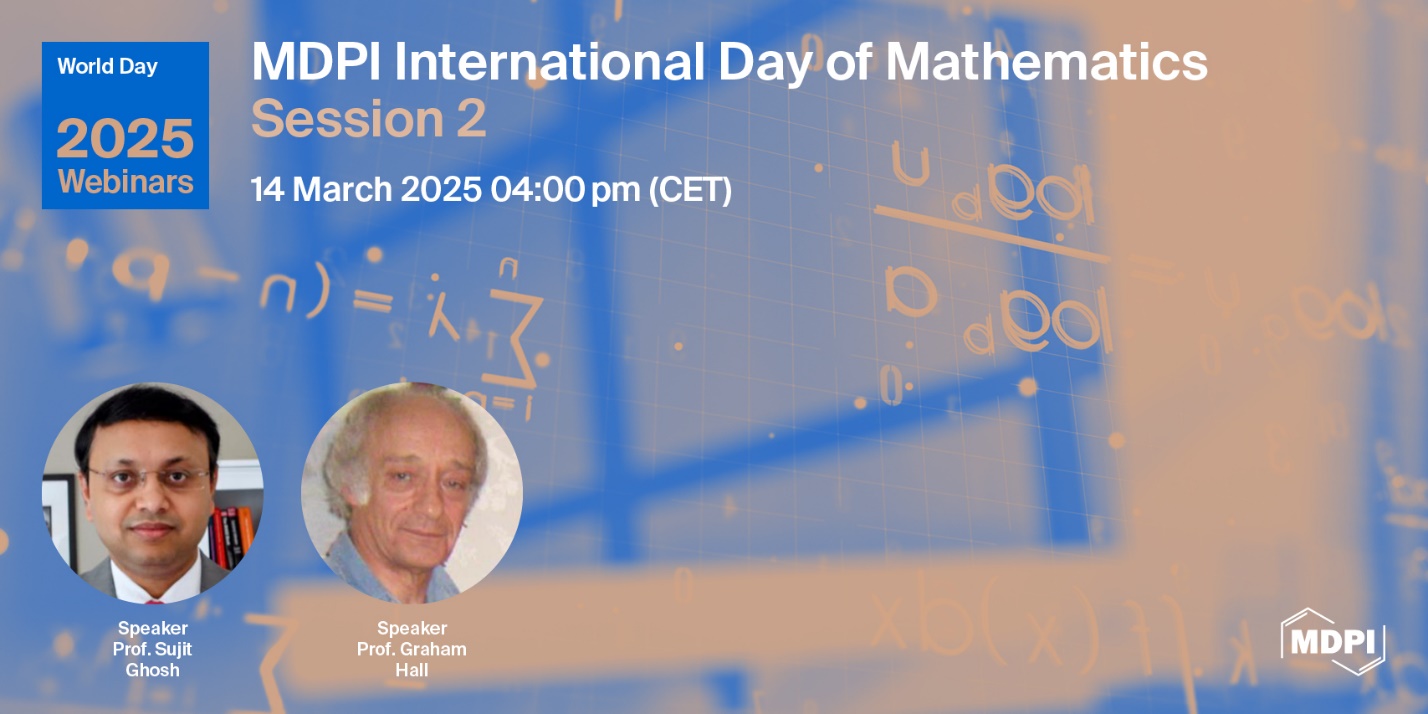
To celebrate International Day of Mathematics 2025, MDPI is hosting a special webinar to bring researchers together, foster collaboration, and highlight the crucial role that mathematics plays in driving breakthroughs across all disciplines. This event aims to raise awareness of how the exchange of ideas and findings enhances our understanding and application of mathematical principles in real-world innovations.
We are very much looking forward to seeing you at the International Day of Mathematics Webinar 2025. Please find an up-to-date outline of the webinar below.
Date: 14 March 2025
Time: 4:00 p.m. CET | 10:00 a.m. EST | 11:00 p.m. CST Asia
Webinar ID: 897 5592 5773
Webinar Secretariat: journal.webinar@mdpi.com
Webinar Announcement: https://sciforum.net/event/MIDoMW2025-2
After registering, you will receive a confirmation email containing information on how to join the webinar. Registrations with academic or institutional email addresses will be prioritized.
Unable to attend? Still feel free to register; we will inform you when the recording is available.
Register now for free!
Program:
|
Speaker/Presentation |
Time in CEST/CET (Basel time) |
Time in EST |
|
MDPI Introduction |
4:00–4:10 p.m. |
10:00–10:10 a.m. |
|
Prof. Sujit Ghosh |
4:10–4:55 p.m. |
10:10–10:55 a.m. |
|
Q&A Session |
4:55–5:00 p.m. |
10:55–11:00 a.m. |
|
Prof. Graham Hall |
5:00–5:45 p.m. |
11:00–11:45 a.m. |
|
Q&A Session |
5:45–5:50 p.m. |
11:45–11:50 a.m. |
|
MDPI Webinar Closing |
5:50–5:55 p.m. |
11:50–11:55 a.m. |
Webinar Keynote Speakers:
- Prof. Sujit Ghosh, Department of Statistics, NC State University, USA;
- Prof. Graham Hall, Institute of Mathematics, University of Aberdeen, Aberdeen, Scotland, UK.
Relevant Topic Information:
Session 1—https://sciforum.net/event/MIDoMW2025
5 March 2025
MDPI Webinar | MDPI International Day of Mathematics—Session 1, 14 March 2025
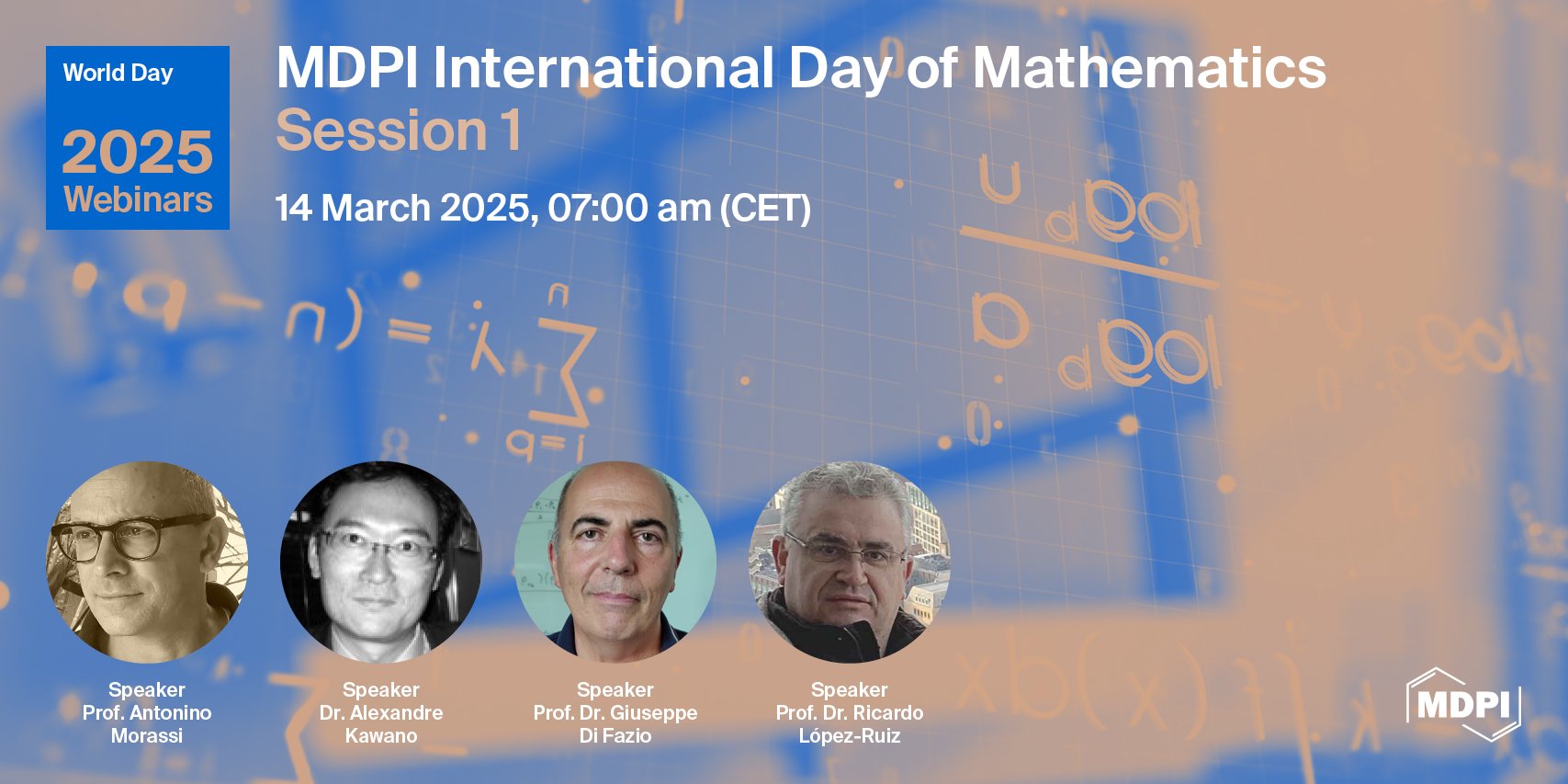
To celebrate International Day of Mathematics 2025, MDPI is hosting a special webinar to bring researchers together, foster collaboration, and highlight the crucial role that mathematics plays in driving breakthroughs across all disciplines. This event aims to raise awareness of how the exchange of ideas and findings enhances our understanding and application of mathematical principles in real-world innovations.
We are very much looking forward to seeing you at the International Day of Mathematics Webinar 2025. Please find an up-to-date outline of the webinar below.
Date: 14 March 2025 at 7:00 a.m. CET | 2:00 a.m. EDT | 2:00 p.m. CST Asia
Webinar ID: 886 5910 5983
Webinar: https://sciforum.net/event/MIDoMW2025
Register now for free!
After registering, you will receive a confirmation email containing information on how to join the webinar. Registrations with academic institutional email addresses will be prioritized.
Unable to attend? Register anyway and we will inform you when the recording is available.
|
Speaker/Presentation |
Time in CET |
Time in CST Asia |
|
MDPI Introduction |
7:00–7:10 a.m. |
2:00–2:10 p.m. |
|
Prof. Antonino Morassi A Continuum Membrane Model for Small Deformations of a Spider Orb Web |
7:10–7:55 a.m. |
2:10–2:55 p.m. |
|
Q&A Session |
7:55–8:00 a.m. |
2:55–3:00 p.m. |
|
Dr. Alexandre Kawano Hearing Spider Orb Webs |
8:00–8:45 a.m. |
3:00–3:45 p.m. |
|
Q&A Session |
8:45–8:50 a.m. |
3:45–3:50 p.m. |
|
Prof. Dr. Giuseppe Di Fazio Degenerate Elliptic Equations Arising from Mechanics of Orb Webs: Qualitative Properties of Generalized Solutions |
8:50–9:35 a.m. |
3:50–4:35 p.m. |
|
Q&A Session |
9:35–9:40 a.m. |
4:35–4:40 p.m. |
|
Prof. Dr. Ricardo López-Ruiz Gas-like Models in Econophysics: Some Results |
9:40–10:10 a.m. |
4:40–5:10 p.m. |
|
Q&A Session |
10:10–10:15 a.m. |
5:10–5:15 p.m. |
|
Closing of Webinar |
10:15–10:20 a.m. |
5:15–5:20 p.m. |
Keynote Speakers:
- Prof. Antonino Morassi, Polytechnic Department of Engineering and Architecture, University of Udine, Udine, Italy;
- Dr. Alexandre Kawano, Department of Mechatronics Engineering and Mechanical Systems - University of Sao Paulo, Brazil;
- Prof. Dr. Giuseppe Di Fazio, Department of Mathematics and Computer Sciences, University of Catania, Italy;
- Prof. Dr. Ricardo López-Ruiz, Department of Computer Science and Systems Engineering, University of Zaragoza, Spain.
Relevant Special Issue:
“Econophysics, Financial Markets, and Artificial Intelligence”
Guest Editor: Prof. Dr. Ricardo Lopez-Ruiz
Submission deadline: 31 March 2025
5 March 2025
Meet Us at the XI International Conference on Coupled Problems in Science and Engineering (COUPLED PROBLEMS 2025), 25–28 May 2025, Villasimius, Italy

Conference: XI International Conference on Coupled Problems in Science and Engineering (COUPLED PROBLEMS 2025)
Organization: European Community on Computational Methods in Applied Sciences
Date: 25–28 May 2025
Place: Villasimius, Italy
MDPI journals will be attending the XI International Conference on Coupled Problems in Science and Engineering as an exhibitor. This meeting will be held in Villasimius, Italy, from 25 to 28 May 2025.
The objectives of COUPLED PROBLEMS 2025 are to present and discuss state-of-the-art, mathematical models, numerical methods and computational techniques for solving coupling problems of multidisciplinary character in science and engineering. The conference goal is to take a step forward in the formulation and solution of real-life problems with a multidisciplinary vision, accounting for all the complex couplings involved in the physical description of the problem.
The conference topics will include, but are not limited to, the following: artificial intelligence and machine learning techniques; coupled solution strategies; loose and strong coupling schemes; mathematical formulation of multidisciplinary problems; numerical methods for coupled problems: finite difference, finite elements, finite volume, meshless methods, particle methods, etc.; optimum design in multi-disciplinary problems; parallel and real-time computational techniques; and applications in science and engineering.
The following MDPI journals will be represented:
- Computation;
- Mathematical and Computational Applications (MCA);
- Modelling;
- AI;
- AppliedMath;
- Mathematics;
- Foundations;
- Energies;
- Computers;
- Symmetry;
- Analytics;
- Eng;
- ASI;
- BDCC.
If you will be attending this conference, please feel free to start a conversation with us. Our delegates look forward to meeting you in person and answering any questions you may have. For more information about the conference, please visit the following website: https://coupled2025.cimne.com/.







